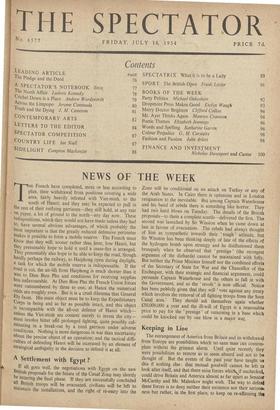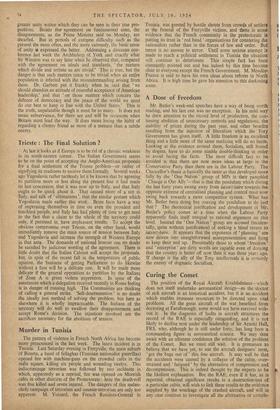Keeping in Line
The estrangement of America from Britain and its withdrawal from Europe are possibilities which no sane man can contem- plate without the greatest alarm. Until quite recently they were possibilities so remote as to seem absurd and not to be thought of. But the events of the past year have taught us this if nothing else: that mutual goodwill cannot be left to look after itself, and that there exist forces whiLia‘if unchecked, could drive Britain and America almost as far apart as Senator McCarthy and Mr. Malenkov might wish. The way to defeat these forces is to deny neither their existence nor their serious. ness but rather, in the first place, to keep on re-affirming t1 greater unity within which they can be seen in their true pro- portions. Beside the agreement on fundamental aims, the disagreements, as the Prime Minister said on Monday, are dwarfed. But in periods of extreme difficulty such as the present the more often, and the more variously, the basic sense of unity is expressed the better. Addressing a diocesan con- ference last week the Archbishop of York said exactly what Sir Winston was to say later when he observed that, compared with the agreement on ideals and standards. the matters which divide and irritate us are trivial.' This is true, but the danger is that such matters cease to be trivial when an entire population is infected with the misunderstanding arising from them. Dr. Garbett put it frankly when he said that we should abandon an attitude of resentful acceptance of American leadership,' and that on those matters which concern the defence of democracy and the peace of the world we must do our best to keep in line with the United States.' This is the truth, unpalatable though it must be to many. It does not mean subservience, for there are and will be occasions when Britain must lead the way. It does mean losing the habit of regarding a clumsy friend as more of a menace than a subtle enemy.



































 Previous page
Previous page